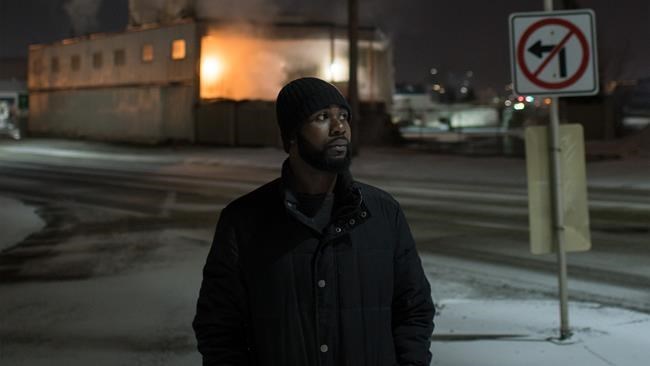For years, Godfred Addai-Nyamekye felt like he was alone in his trauma from being a victim of police violence in Calgary.
"Three years ago, four years ago, I was in the wilderness, screaming by myself," Addai-Nyamekye says in a phone interview.
As Addai-Nyamekye explains in the documentary "Above the Law," debuting Saturday on "CBC Docs POV" and CBC Gem, police officers in the city unlawfully detained him when his car got stuck in the snow in December 2013.
He says they drove him to a remote location and abandoned him in -28 Celsius weather in the middle of the night.
After calling 911 for help, Addai-Nyamekye says he was tasered and assaulted by a constable who came to his location and chided him for calling the emergency line.
He was left in so much pain he could barely stand, and with post-traumatic stress disorder that continues to this day.
Addai-Nyamekye was charged with assaulting a police officer in the incident but was later acquitted after a judge saw video, taken from a police helicopter, showing him being beaten and dragged while handcuffed through the snow by an officer.
He got no compensation, but amid the release of the documentary and a global movement against systemic racism and police brutality, he says he's happy to finally see some attention on cases like his.
"It's about time that we let Canadians know that these kind of issues are out here, police brutality is out here, injustice is out here, discrimination — everything is out here," says Addai-Nyamekye, who was born in Ghana.
"Whatever issues are in the States, are out here. And it's about time that we sit back and look at all these issues, and we address them."
"Above the Law" explores three cases of excessive force involving the Calgary Police Service, including that of Anthony Heffernan, who was tasered and shot to death by an officer during a wellness check in a hotel room in March 2015.
The Alberta Serious Incident Response Team (ASIRT) initially found there were grounds to charge the officer with a criminal offence, but the Crown later determined a conviction was unlikely and no charges would be laid.
Also featured is the May 2015 arrest of the late Daniel Haworth, whose family says he suffered brain damage from being punched and thrown to the ground while handcuffed. Haworth died of a drug overdose several months later.
Const. Trevor Lindsay, the same officer involved in Addai-Nyamekye's case, was convicted of aggravated assault in June 2019.
According to the filmmakers, Lindsay spent 2.5 years on relief from duty with pay while he was awaiting trial. He is now relieved from duty without pay and remains free while he awaits sentencing. He's expected to appeal his conviction.
"I think in Canada, for a very long time, we've been acting under the presumption that these are American problems," says Marc Serpa Francoeur, who co-directed the documentary with Robinder Uppal.
"We're so inundated with American media and films, and we watch American court cases, all this stuff, but I don't think we look internally enough."
Serpa Francoeur says they embarked on the film five years ago and looked into systemic policing issues and accountability mechanisms on the force and on a provincial level.
But he notes: "These problems are not endemic to Calgary."
"We need to have confidence that officers are being held to account by what is required of them on a legislative level by the Police Act, what is required of them by criminal law," Serpa Francoeur says.
"There are too many instances where you're looking at a lot of double standard."
Addai-Nyamekye has launched several formal complaints about his case, and a lawsuit against Lindsay, the other officers and the Crown prosecutors — all of which have not been resolved.
He wonders what his fate would have been if the helicopter had not been around to shoot video that exonerated him.
Addai-Nyamekye wants to see police including Lindsay be held accountable for their actions, and for members of the force to be required to undergo more training than the current period of six months.
"I want to see more transparency in that police force," he says. "I want to see a more multicultural police force, not just white."
Before the incident, Addai-Nyamekye was a "go-getter" with no health issues, he says.
But after, he faced hefty legal and therapy bills, and was unable to work. He wound up homeless, sleeping on friends' couches, for six months.
"It's been a terrible journey, in terms of going back to the scene and having all these bad memories come back, flashbacks and PTSD," Addai-Nyamekye says.
But he's hopeful the documentary will shed some light on police brutality and injustices.
And he feels a duty to talk publicly about his experience.
"I'm a victim and I'm a living testimony," Addai-Nyamekye says. "If I don't speak up, who else is going to speak up?"
This report by The Canadian Press was first published July 9, 2020.
Victoria Ahearn, The Canadian Press



